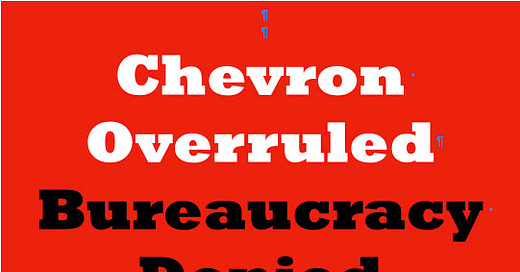Justice Clarence Thomas is, in my opinion, our greatest living American. That’s why, when the Chevron overruling came down from our Supreme Court, I went straight to his concurring opinion. I was not disappointed. I offer it below minus the distracting citations and in shorter paragraphs to emphasize the wisdom expressed.
I join the Court’s opinion in full because it correctly concludes that Chevron U. S. A. Inc. v. Natural Resources Defense Council, Inc., must finally be overruled. Under Chevron, a judge was required to adopt an agency’s interpretation of an ambiguous statute, so long as the agency had a “permissible construction of the statute.”
As the Court explains, that deference does not comport with the Administrative Procedure Act, which requires judges to decide “all relevant questions of law” and “interpret constitutional and statutory provisions” when reviewing an agency action.
I write separately to underscore a more fundamental problem: Chevron deference also violates our Constitution’s separation of powers, as I have previously explained at length.
And, I agree with Justice Gorsuch that we should not overlook Chevron’s constitutional defects in overruling it.
To provide “practical and real protections for individual liberty,” the Framers drafted a Constitution that divides the legislative, executive, and judicial powers between three branches of Government.
Chevron deference compromises this separation of powers in two ways. It curbs the judicial power afforded to courts, and simultaneously expands agencies’ executive power beyond constitutional limits. Chevron compels judges to abdicate their Article III “judicial power.”
The Framers understood that “legal texts … often contain ambiguities,” and that the judicial power included “the power to resolve these ambiguities over time.” But, under Chevron, a judge must accept an agency’s interpretation of an ambiguous law, even if he thinks another interpretation is correct.
Chevron deference thus prevents judges from exercising their independent judgment to resolve ambiguities. By tying a judge’s hands, Chevron prevents the Judiciary from serving as a constitutional check on the Executive. It allows “the Executive . . . to dictate the outcome of cases through erroneous interpretations.”
Because the judicial power requires judges to exercise their independent judgment, the deference that Chevron requires contravenes Article III’s mandate.
Chevron deference also permits the Executive Branch to exercise powers not given to it. “When the Government is called upon to perform a function that requires an exercise of legislative, executive, or judicial power, only the vested recipient of that power can perform it.”
Because the Constitution gives the Executive Branch only “[t]he executive Power,” executive agencies may constitutionally exercise only that power. But, Chevron gives agencies license to exercise judicial power.
By allowing agencies to definitively interpret laws so long as they are ambiguous, Chevron “transfer[s]” the Judiciary’s “interpretive judgment to the agency.”
Chevron deference “cannot be salvaged” by recasting it as deference to an agency’s “formulation of policy.” If that were true, Chevron would mean that “agencies are unconstitutionally exercising ‘legislative Powers’ vested in Congress.”
By “giv[ing] the force of law to agency pronouncements on matters of private conduct as to which Congress did not actually have an intent,” Chevron “permit[s] a body other than Congress to perform a function that requires an exercise of legislative power.” No matter the gloss put on it, Chevron expands agencies’ power beyond the bounds of Article II by permitting them to exercise powers reserved to another branch of Government.
Chevron deference was “not a harmless transfer of power.” “The Constitution carefully imposes structural constraints on all three branches, and the exercise of power free of those accompanying restraints subverts the design of the Constitution’s ratifiers.”
In particular, the Founders envisioned that “the courts [would] check the Executive by applying the correct interpretation of the law.” Chevron was thus a fundamental disruption of our separation of powers. It improperly strips courts of judicial power by simultaneously increasing the power of executive agencies.
By overruling Chevron, we restore this aspect of our separation of powers. To safeguard individual liberty, “[s]tructure is everything.”
Although the Court finally ends our 40-year misadventure with Chevron deference, its more profound problems should not be overlooked. Regardless of what a statute says, the type of deference required by Chevron violates the Constitution.
The significance of overruling Chevron includes the fact the original decision involved the Natural Resources Defense Council (NRDC), a Rockefeller created and directed entity that has had undue influence over government policy for decades. Indeed, NGOs such as the NRDC have been effectively running agencies of government ever since Chevron. They do it through “sue and settle” schemes, for example, that directly undermine the role of legislators.
Chevron, in fact, undermined a fundamental principle of land use law, namely that zoning is a derogation of the common law and, therefore, any ambiguities must always be resolved in favor of landowners whose rights have already been compromised. Chevron turned that principle upside-down and inside-out to give the bureaucracy the benefit of the doubt where there are ambiguities. We saw that with the Delaware River Basin Commission when it arbitrarily outlawed fracking as an extension of its rights to protect water quality, making a land use restriction out of a water quality standard. We saw the same thing in New York.
Such capricious and irrational decisions will likely be overturned in the future because they extended the law by bureaucratic edict. Thank Justice Thomas and the other five Justices who finally did the right thing.
#Chevron #JudicialPower #Constitution #Founders #Bureaucracy #Congress






Of all the issues that have come before the Court in the last ten-twenty years Chevron deference has been the one I have mostly closely watched. This decision can extend to so many other alphabet agencies. Frankly, Congress created this mess because they were lazy and the Obama and Biden administrations have taken most advantage of this. I hope the spillover will be swift.
Thomas' Memoir "My Grandfather's Son" is an excellent read.